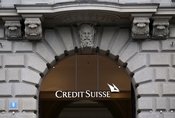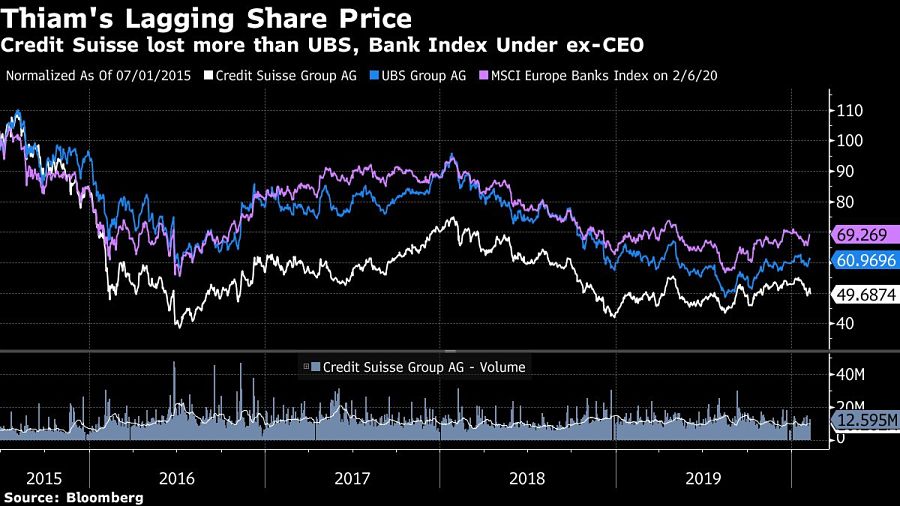

Credit Suisse Group ousted Chief Executive Tidjane Thiam, a move the bank’s chairman called an attempt to fix its reputation in the wake of a scandal that unnerved the Swiss establishment.
“We saw a deterioration in terms of trust, reputation and credibility among all our stakeholders,“ Chairman Urs Rohner said in an interview Friday after the board closed ranks to rebuff appeals from major shareholders in the U.S. and U.K. to back Mr. Thiam. “It became really relevant” because the damage was notable in Switzerland, source of 40% of the bank’s pretax income, Mr. Rohner said.
Thomas Gottstein, 55, a two-decade Credit Suisse veteran, was named to succeed Mr. Thiam, making him the bank’s first Swiss-born CEO in almost two decades. Investors will look to him to restore calm in a boardroom shaken by personal animosities and reverse a slump in the lender’s shares after they lost almost half their value during Mr. Thiam’s tenure.
Mr. Thiam’s exit represents the culmination of a conflict between the CEO and Mr. Rohner that escalated after it emerged that top management hired detectives to follow former executive Iqbal Khan. While Mr. Thiam, 57, was cleared in an internal probe and a close lieutenant was blamed, the bank struggled to move beyond the scandal following the disclosure of another spying episode in December. Swiss regulators have launched their own inquiry, raising questions about the culture at the top of the firm.
The second incident “made the situation worse,” Mr. Rohner said. It became clear “that there was more of a pattern.”
Top shareholders including Harris Associates, Silchester International Investors and Eminence Capital had warned the board of directors before Thursday’s meeting that if there was a choice to be made, Mr. Rohner should be the one to go. They urged the chairman to back Mr. Thiam or step down. Mr. Rohner’s backers saw the high-profile demands as an unseemly gambit, according to a person familiar with the matter. Meanwhile, the chairman lined up support behind the scenes from other shareholders for the board, including Qatar’s sovereign wealth fund, the person said.
The chairman’s focus on the damage done in Credit Suisse’s home market — “among all of our stakeholders, clients, employees, regulators” — contrasts with complaints from non-Swiss investors, notably David Herro, deputy chairman of Harris Associates, who said concerns were limited to the Zurich financial district.
Mr. Herro stood by his criticism of Mr. Rohner, calling on him to quit. “Our worry is that you have this new CEO who is capable and talented but above him, a chairman who is less than capable and talented and a board who seems to just mimic, just follows blindly whatever he says,” Mr. Herro told Bloomberg TV.
“We agree to disagree,” Mr. Rohner said.
While Credit Suisse’s profit has increased for three consecutive years under Mr. Thiam, its stock has fallen more than UBS and the Stoxx 600 Banks Index. The shares fell on Mr. Thiam’s exit, declining 1.6% to 12.58 francs at 1:48 p.m. in Zurich.

“Tidjane has made an enormous contribution to Credit Suisse since he joined us in 2015,” Mr. Rohner said in the statement. “It is to his credit that Credit Suisse is standing on a very solid foundation and has returned successfully to profit.”
For Mr. Thiam, who was born in Ivory Coast and previously held top roles at Aviva Plc and Prudential before Mr. Rohner hired him in 2015, the departure blemishes a record that includes a pivot away from volatile trading and toward the more stable business of catering to affluent clients.
Mr. Thiam took over at Credit Suisse in mid-2015 and quickly outlined a plan to slash costs, boost profitability and increase his firm’s financial strength. A former politician and insurance executive, he had no direct experience in investment banking, a business that became one of his biggest headaches. He was blindsided by losses at the trading unit in 2016, which pushed him to accelerate cost cuts.
Thiam’s troubles
The latest troubles started in September when Swiss media reported that Mr. Khan, who had left for crosstown rival UBS Group, confronted his pursuers in downtown Zurich. Embarrassing disclosures followed, including accounts of the personal feud between Mr. Thiam and Mr. Khan and the suicide of a contractor, rattling business circles in a city that normally enjoys a reputation for quiet professionalism.
An internal probe concluded that Mr. Thiam didn’t know about the spying and that chief operating officer Pierre-Olivier Bouee was responsible. Mr. Bouee was fired late last year. It later came out that human resources chief Peter Goerke was also followed, which the bank also blamed on Mr. Bouee.
“I had no knowledge of the observation of two former colleagues,” Mr. Thiam said in the Friday statement. “It undoubtedly disturbed Credit Suisse and caused anxiety and hurt. I regret that this happened and it should never have taken place.”
A third spying case, involving a former Credit Suisse employee in the U.S., was also probed and rejected by the bank. However, lawyers for Credit Suisse were still looking into the matter as recently as last week, Bloomberg reported on Tuesday.
Mr. Thiam’s resignation after prominent overseas shareholders had backed him marks a victory for the Swiss establishment. A former lawyer who has been chairman of Credit Suisse for a decade, Mr. Rohner’s leadership “during this turbulent time” was praised by lead independent director Severin Schwan, CEO of Swiss pharmaceuticals company Roche Holding.
Mr. Gottstein is CEO of Credit Suisse Switzerland and has been in the banking industry for 30 years, including more than 20 at Credit Suisse. His experience includes 13 years in investment banking in London, as well as in private banking. The unit, known as the Swiss Universal Bank, is a sort of miniature Credit Suisse focused on the domestic market. It’s the biggest contributor to pretax profit and includes a private banking arm as well as investment banking.
The new CEO also sits on the board the regulator Finma. It’s unclear what impact the change in leadership at Credit Suisse will have on its investigation into the scandal. Finma said in December that it had appointed an independent auditor to investigate the case and that such probes typically take several months. No one at the regulator was immediately available on Friday morning to comment on the news.
“Gottstein is very Swiss, it’s a big contrast,” said Andreas Venditti, an analyst at Vontobel. Still, he “has a background in investment banking — he doesn’t know only Switzerland. I wouldn’t say that this is a retreat from a global ambition.”

Relationships are key to our business but advisors are often slow to engage in specific activities designed to foster them.

Whichever path you go down, act now while you're still in control.

Pro-bitcoin professionals, however, say the cryptocurrency has ushered in change.

“LPL has evolved significantly over the last decade and still wants to scale up,” says one industry executive.

Survey findings from the Nationwide Retirement Institute offers pearls of planning wisdom from 60- to 65-year-olds, as well as insights into concerns.
Streamline your outreach with Aidentified's AI-driven solutions
This season’s market volatility: Positioning for rate relief, income growth and the AI rebound
